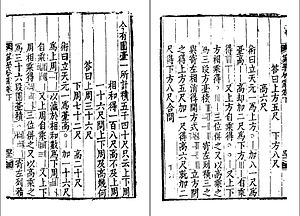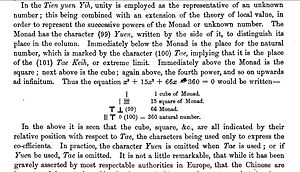- Tian yuan shu
-
Tian yuan shu (simplified Chinese: 天元术; traditional Chinese: 天元術; pinyin: tiān yuán shù) is a Chinese system of algebra for polynomial equations created in the 13th century. It is first known from the writing of Li Zhi (Li Ye), though it was created earlier.
The mathematical culture in which it was created was lost due to war and general suspiciousness during the Ming dynasty of knowledge from the (Mongolian) Yuan dynasty. The writings of Li Zhi, Qin Jiushao, Zhu Shijie and others could no longer be fully understood, until the arrival of western mathematics in China.
Meanwhile tian yuan shu arrived in Japan where it is called Tengen-jutsu. The book Suanxue qimeng by Zhu Shijie, was deciphered and was important in the development of Japanese mathematics (wasan) in the 17th and 18th centuries.
Description
Tian yuan shu means "method of the heavenly element" or "technique of the celestial unknown". The heavenly element is the unknown variable, usually written x in modern notation.
It is a positional system of rod numerals to represent polynomial equations. For example 2x2 + 18x − 316 = 0 is represented as
 which in Arabic numerals is
which in Arabic numerals is 
The 元 (yuan) denotes the unknown x, so the numerals on that line mean 18x. The line below is the constant term (-316) and the line above is the coefficient of the quadratic (x2) term. The system accommodates arbitrarily high exponents of the unknown by adding more lines on top and negative exponents by adding lines below the constant term. Decimals can also be represented.
In later writings of Li Zhi and Zhu Shijie, the line order was reversed so that the first line is the lowest exponent.
See also
Yigu yanduan
References
- Martzloff, Jean-Claude (2006). A History of Chinese Mathematics. trans. Stephen S. Wilson. Springer. pp. 258–272. ISBN 3540337822. http://books.google.com/books?id=ACK1jreKgCoC&pg=PA258. Retrieved 2009-12-28.
- Murata, Tamotsu (2003). "Indigenous Japanese mathematics, Wasan". In Ivor Grattan-Guinness. Companion Encyclopedia of the History and Philosophy of the Mathematical Sciences. 1. JHU Press. pp. 105–106. ISBN 0801873967. http://books.google.com/books?id=2hDvzITtfdAC&pg=PA105. Retrieved 2009-12-28.
Categories:- Chinese mathematics
- Japanese mathematics
- Polynomials
Wikimedia Foundation. 2010.


